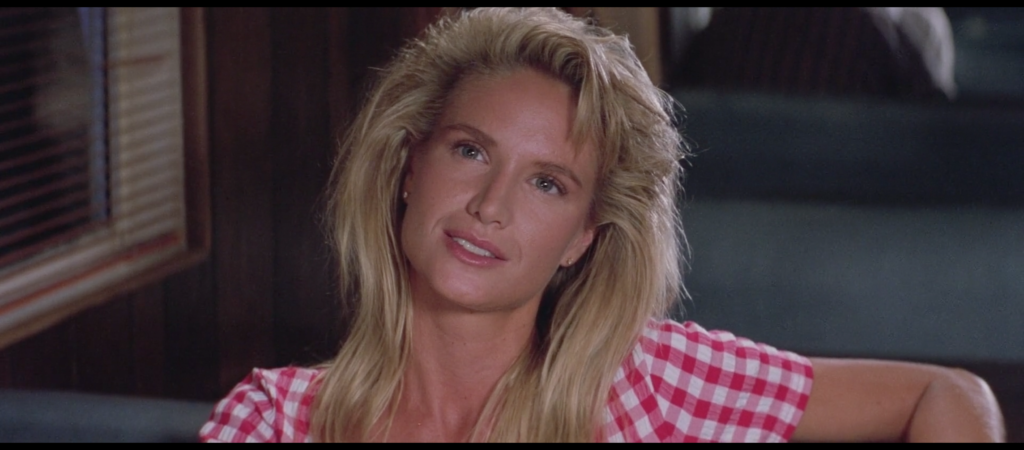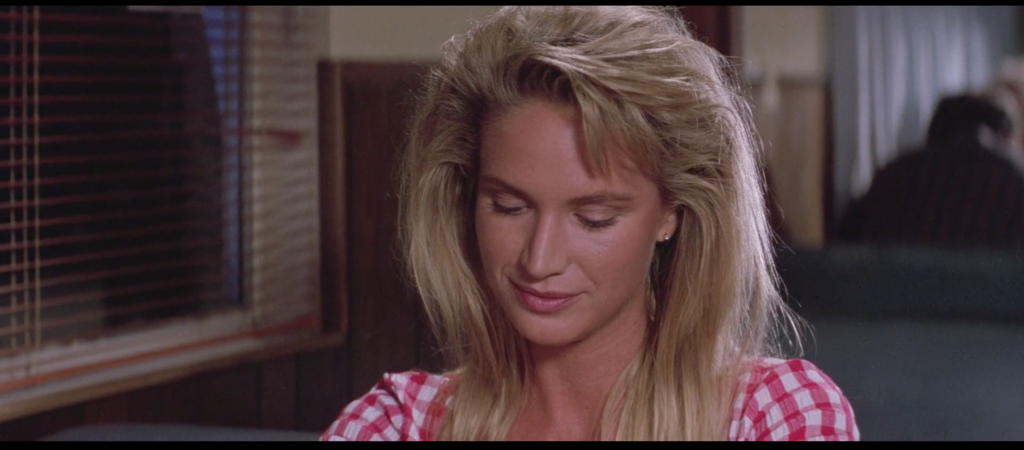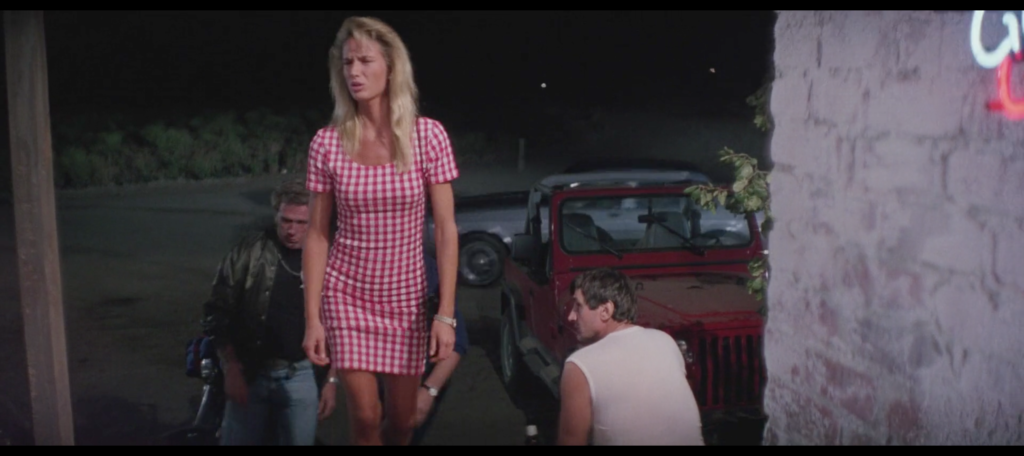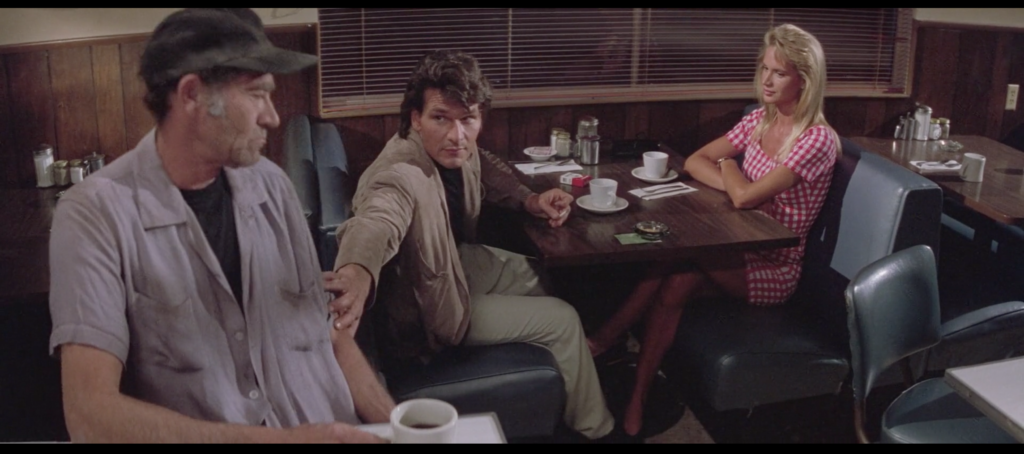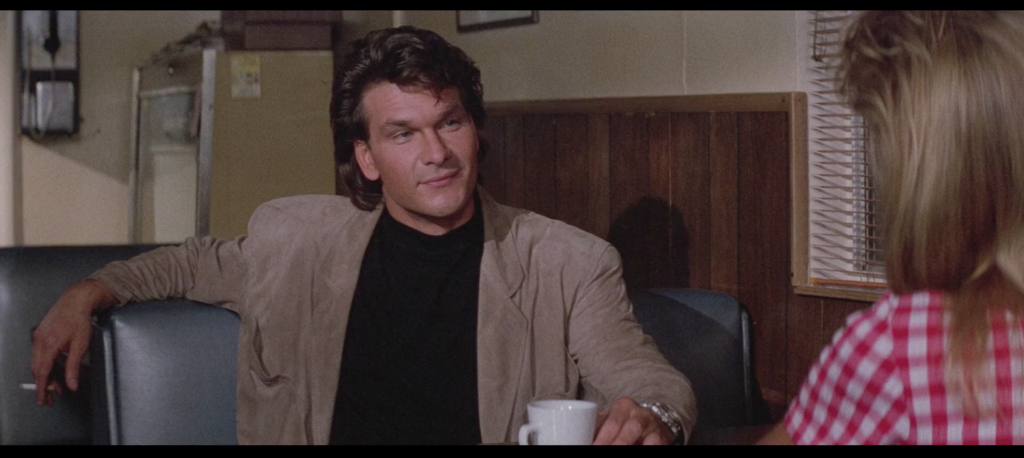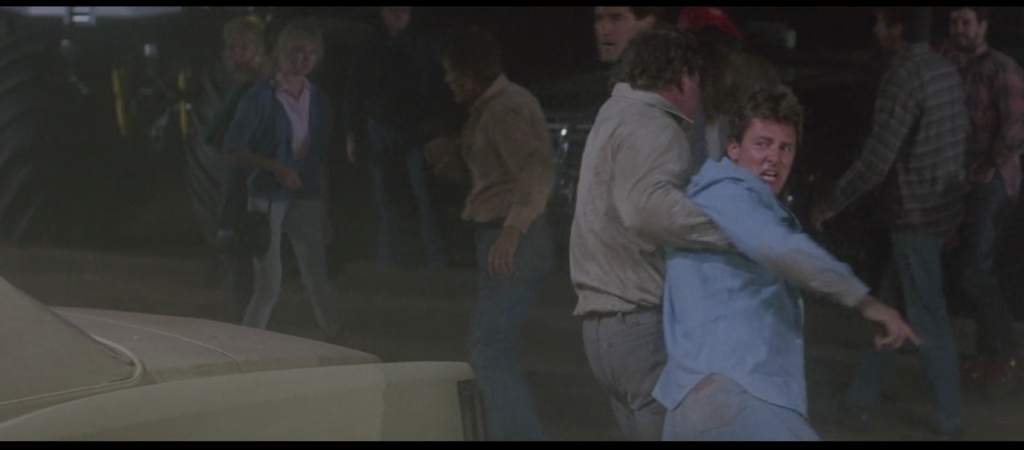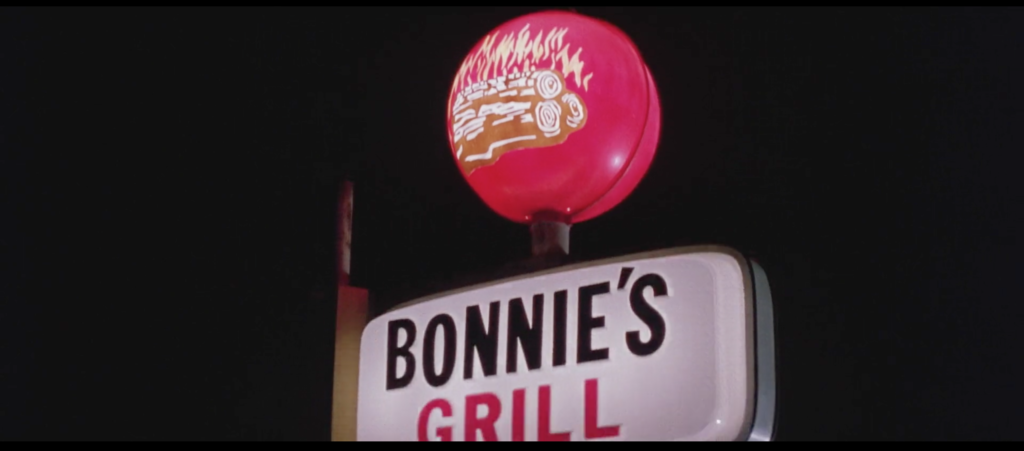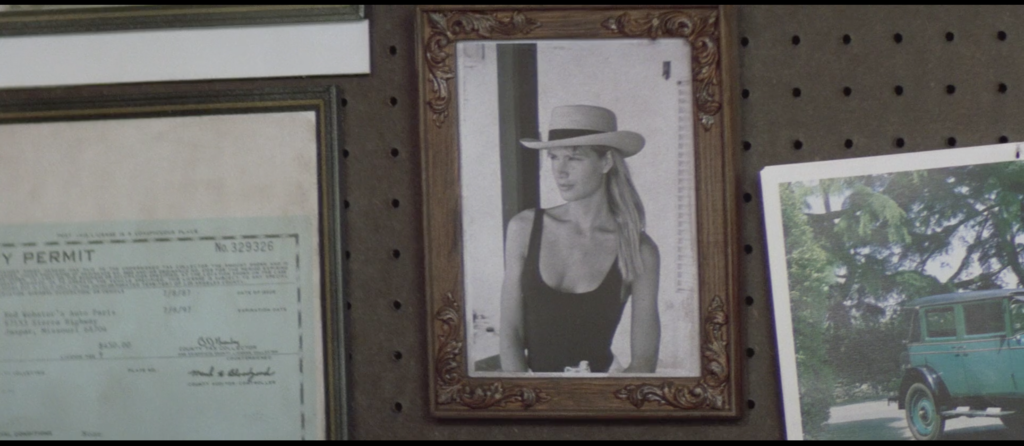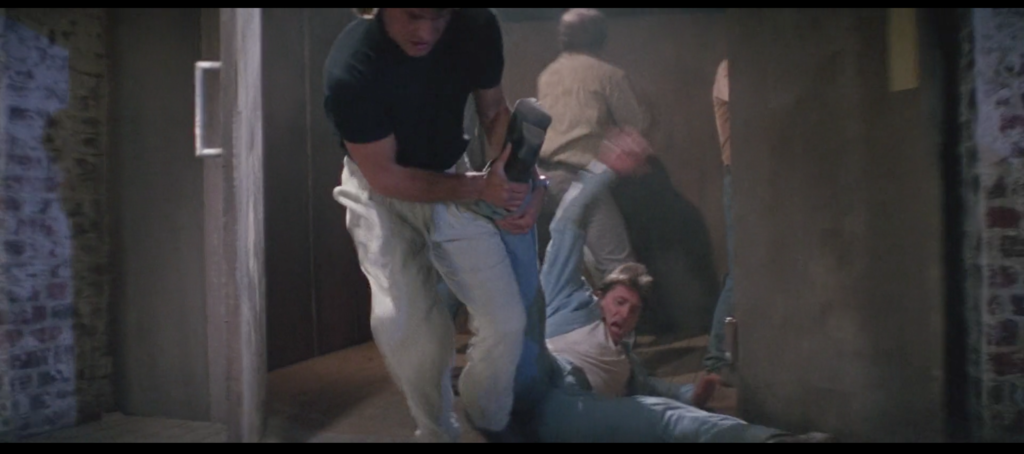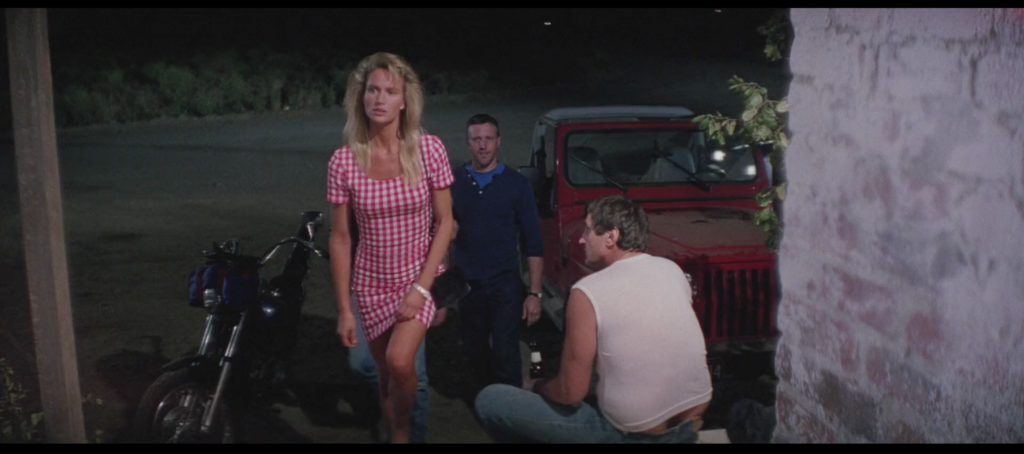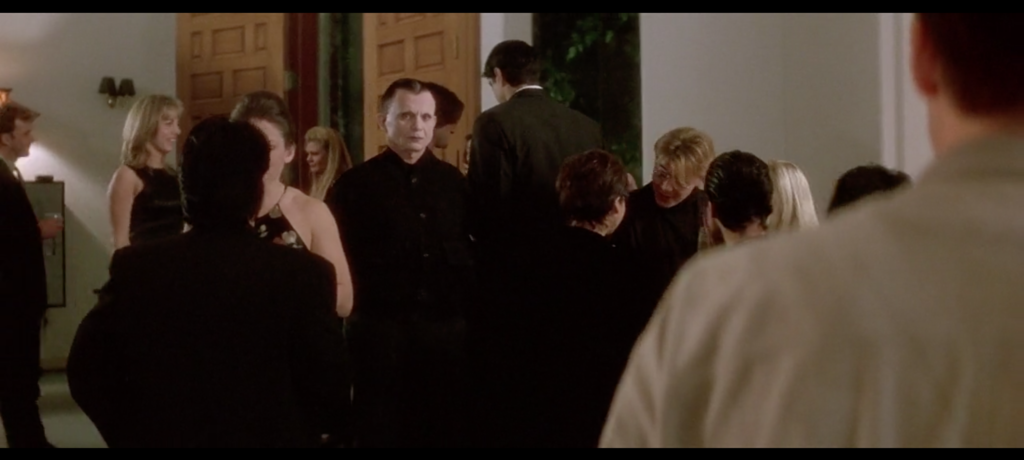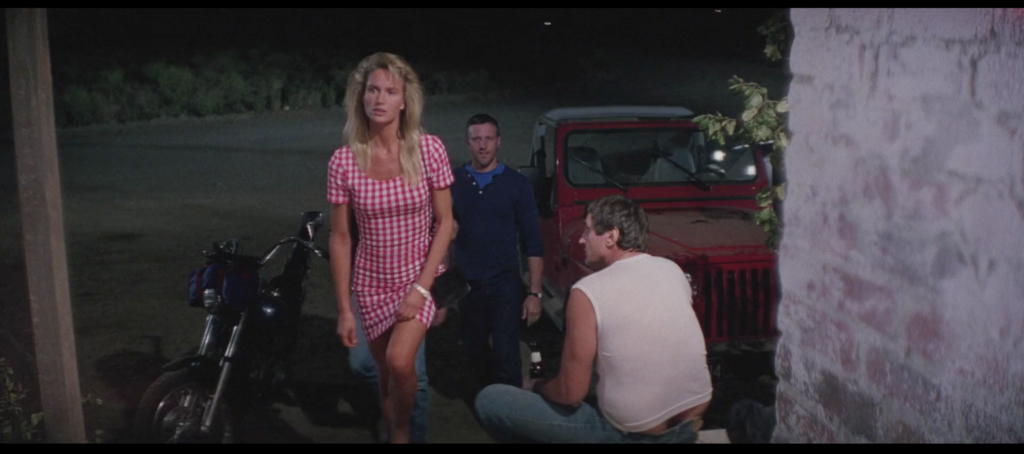Caught completely off guard by an opponent he didn’t see coming (not yet anyway, rimshot), Dalton straight-up gives up on his date with the Doc. I’m serious, man, he just takes his balls and goes home. He drops his smile, fidgets, looks out the window, takes a final drag of his cigarette, and acts like he’s just had the completely unrelated idea that it’s time to take her home. “I keep talking, you’re gonna go off thinking I’m a nice guy.” He’s putting his pack of Marlboros into his jacket pocket, he’s smiling and raising his eyebrows and doing little head nods, haha, he’s back in business baby!
Done with looking away from this man, Elizabeth reclaims his gaze, seizes control of it. Her voice a bedroom-fireplace crackle, her smile spreading like an inkblot, she looks him dead in the eyes and says “I know you’re not a nice guy.”
Pain don’t hurt, or so we’ve been told. From this we can conclude, can we not, that Dalton is a sub, or at the very least (and given what we see of his later behavior this proves out) a switch. It follows that the moment Dr. Elizabeth Clay smiles at him while calling him a piece of shit is the moment Dalton falls in love with Dr. Elizabeth Clay.
It will all go very smoothly from there, I’m quite sure.
Take it away, Larry Underwood and friend.
“Sure,” she said, cringing back and starting to cry. “Why not? Big star. Fuck
and run. I thought you were a nice guy. You ain’t no nice guy.” Several tears
ran down her cheeks, dropped from her jaw, and plopped onto her upper chest.
Fascinated, he watched one of them roll down the slope of her right breast and
perch on the nipple. It had a magnifying effect. He could see pores, and one
black hair sprouting from the inner edge of the aureole. Jesus Christ, I’m going
crazy, he thought wonderingly.“I have to go,” he said. His white cloth jacket was on the foot of the bed. He
picked it up and slung it over his shoulder.“You ain’t no nice guy!” she cried at him as he went into the living room. “I
only went with you because I thought you were a nice guy!”The sight of the living room made him feel like groaning. On the couch where
he dimly remembered being gobbled were at least two dozen copies of “Baby, Can
You Dig Your Man?” Three more were on the turntable of the dusty portable
stereo. On the far wall was a huge poster of Ryan O’Neal and Ali McGraw. Being
gobbled means never having to say you’re sorry, ha-ha. Jesus, I am going crazy.She stood in the bedroom doorway, still crying, pathetic in her half-slip. He
could see a nick on one of her shins where she had cut herself shaving.“Listen, give me a call,” she said. “I ain’t mad.”
He should have said, “Sure,” and that would have been the end of it. Instead
he heard his mouth utter a crazy laugh and then, “Your kippers are burning.”She screamed at him and started across the room, only to trip over a throw-
pillow on the floor and go sprawling. One of her arms knocked over a half-empty
bottle of milk and rocked the empty bottle of Scotch standing next to it. Holy
God, Larry thought, were we mixing those?He got out quickly and pounded down the stairs. As he went down the last six
steps to the front door, he heard her in the upstairs hall, yelling down: “You
ain’t no nice guy! You ain’t no—”He slammed the door behind him and misty, humid warmth washed over him,
carrying the aroma of spring trees and automobile exhaust. It was perfume after
the smell of frying grease and stale cigarette smoke. He still had the crazy
cigarette, now burned down to the filter, and he threw it into the gutter and
took a deep breath of the fresh air. Wonderful to be out of that craziness.
Return with us now to those wonderful days of normalcy as weAbove and behind him a window went up with a rattling bang and he knew what
was coming next.“I hope you rot!” she screamed down at him. The Compleat Bronx Fishwife. “I
hope you fall in front of some fuckin subway train! You ain’t no singer! You’re
shitty in bed! You louse! Pound this up your ass! Take this to ya mother, you
louse! “The milk bottle came zipping down from her second-floor bedroom window. Larry
ducked. It went off in the gutter like a bomb, spraying the street with glass
fragments. The Scotch bottle came next, twirling end over end, to crash nearly
at his feet. Whatever else she was, her aim was terrifying. He broke into a run,
holding one arm over his head. This madness was never going to end.From behind him came a final long braying cry, triumphant with juicy Bronx
intonation: “KISS MY ASS, YOU CHEAP BAAASTARD!” Then he was around the corner
and on the expressway overpass, leaning over, laughing with a shaky intensity
that was nearly hysteria, watching the cars pass below.“Couldn’t you have handled that better?” he said, totally unaware he was
speaking out loud. “Oh man, you coulda done better than that. That was a bad
scene. Crap on that, man.” He realized he was speaking aloud, and another burst
of laughter escaped him. He suddenly felt a dizzy, spinning nausea in his
stomach and squeezed his eyes tightly closed. A memory circuit in the Department
of Masochism clicked open and he heard Wayne Stukey saying, There’s something in
you that’s like biting on tinfoil.He had treated the girl like an old whore on the morning after the frathouse
gangbang.You ain’t no nice guy.
I am. I am.
But when the people at the big party had protested his decision to cut them
off, he had threatened to call the police, and he had meant it. Hadn’t he? Yes.
Yes, he had. Most of them were strangers, true, he could care if they crapped on
a landmine, but four or five of the protestors had gone back to the old days.And Wayne Stukey, that bastard, standing in the doorway with his arms folded
like a hanging judge on the big day.Sal Doria going out, saying: If this is what it does to guys like you, Larry, I wish you were still playing sessions.
He opened his eyes and turned away from the overpass, looking for a cab. Oh
sure. The outraged friend bit. If Sal was such a big friend, what was he doing
there sucking off him in the first place? I was stupid and nobody likes to see a
stupid guy wise up. That’s the real story.You ain’t no nice guy.
“I am a nice guy,” he said sulkily. “And whose business is it, anyway?”
A cab was coming and Larry flagged it. It seemed to hesitate a moment before
pulling up to the curb, and Larry remembered the blood on his forehead. He
opened the back door and climbed in before the guy could change his mind.“Manhattan. The Chemical Bank Building on Park,” he said.
The cab pulled out into traffic. “You got a cut on your forehead, guy,” the
cabbie said.“A girl threw a spatula at me,” Larry said absently.
The cabbie offered him a strange false smile of commiseration and drove on,
leaving Larry to settle back and try to imagine how he was going to explain his
night out to his mother.

